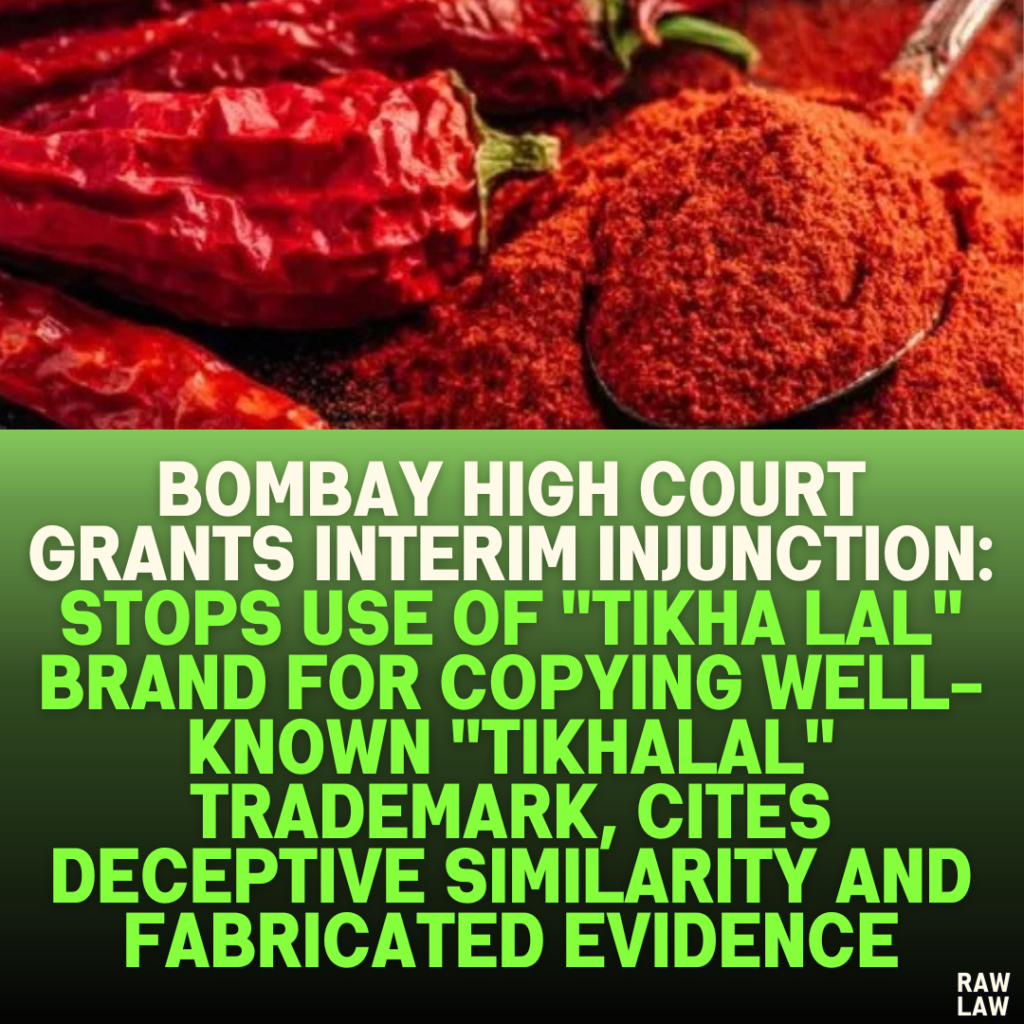Court’s Decision:
The Bombay High Court granted an interim injunction against the defendants, restraining them from using the trademark “Tikha Lal,” finding it deceptively similar to the plaintiff’s registered trademark “Tikhalal.” The court ruled that the defendants acted dishonestly by producing fabricated invoices to show prior use of the impugned mark. The court emphasized that such actions undermined the credibility of the defense and held that the plaintiff established a prima facie case of infringement and passing off.
Facts:
- The plaintiff is a reputed manufacturer of spices and masalas under the brand “Everest” and has held a trademark for “Tikhalal” since 2002.
- The defendants marketed chili powder under the name “Tikha Lal” and sought to justify its use as descriptive of the product’s characteristics.
- The plaintiff discovered the defendants’ use of the impugned mark in 2019 and issued a cease-and-desist notice, followed by legal proceedings in 2021.
- The defendants had registered a similar device mark and also filed a trademark application for “Shyam Tikha Lal,” which the plaintiff opposed.
Issues:
- Is “Tikha Lal” deceptively similar to “Tikhalal,” leading to infringement of the plaintiff’s trademark?
- Was the use of “Tikha Lal” descriptive under Section 30(2)(a) of the Trademarks Act, 1999?
- Did the defendants act dishonestly by submitting fabricated evidence?
- Does the plaintiff’s delay in filing the suit weaken their claim?
Petitioner’s Arguments:
- Trademark Similarity:
- The marks “Tikhalal” and “Tikha Lal” are phonetically, visually, and aurally similar.
- Such similarity creates confusion among consumers, especially as both marks pertain to chili powder.
- Established Reputation:
- The plaintiff has extensively used and marketed the “Tikhalal” mark since 2002, gaining significant goodwill and reputation.
- Dishonest Conduct:
- The defendants submitted fabricated sales invoices, including discrepancies in product descriptions, to falsely establish prior use of “Tikha Lal.”
- Legal Precedents:
- Cited judgments like Hiralal Parbhudas v. Ganesh Trading Company and Midas Hygiene v. Sudhir Bhatia, emphasizing that deceptive similarity and dishonest conduct warrant injunctions.
Respondent’s Arguments:
- Descriptive Use:
- “Tikha Lal” was used descriptively to indicate the spicy nature of the chili powder, falling under the protection of Section 30(2)(a).
- Market Presence:
- The defendants claimed uninterrupted and extensive use of “Tikha Lal” since 2015, asserting that no actual confusion had occurred.
- Delay and Acquiescence:
- The plaintiff delayed initiating legal action, weakening their claim for urgent relief.
- Alternative Proposal:
- Offered to change the mark to “Tikha Tej” or “Tikha Tikha,” subject to the court’s approval.
Analysis of the Law:
- Trademark Infringement:
- Section 29(2)(c) and 29(3) of the Trademarks Act provide that the use of a mark identical or similar to a registered trademark is an infringement if it causes confusion or association with the original mark.
- The court held that “Tikha Lal” was deceptively similar to “Tikhalal” and likely to confuse consumers.
- Descriptive Use Defense:
- Section 30(2)(a) allows the use of descriptive terms to indicate the kind or quality of goods. However, the court found that “Tikha Lal” was used as a trademark, not descriptively.
- The visual and marketing presentation of “Tikha Lal” by the defendants suggested its use as a brand name rather than as a descriptor.
- Dishonest Conduct:
- Fabricated invoices and contradictory affidavits filed by the defendants demonstrated their dishonesty, undermining their defense.
- The court emphasized that dishonesty disentitles a party from equitable relief.
Precedent Analysis:
- Hiralal Parbhudas v. Ganesh Trading Company: Outlined tests for deceptive similarity, such as phonetic, visual, and aural resemblance.
- Midas Hygiene v. Sudhir Bhatia: Held that delay does not bar relief in clear cases of infringement.
- Hem Corporation v. ITC Ltd.: Confirmed that descriptive use must be genuine and bona fide, not a guise for trademark use.
Court’s Reasoning:
- Similarity and Confusion:
- The marks were phonetically and visually similar, and the defendants’ use of “Tikha Lal” created a likelihood of confusion.
- Evidence of Dishonesty:
- The defendants presented fabricated invoices to falsely claim prior use of the impugned mark.
- The contradictory affidavits filed by the defendants further highlighted their lack of credibility.
- Reputation of the Plaintiff:
- The plaintiff demonstrated extensive goodwill and reputation for “Tikhalal,” supported by sales records and marketing efforts.
Conclusion:
The court granted an interim injunction restraining the defendants from using “Tikha Lal” or any similar mark. The plaintiff established a prima facie case of infringement, and the defendants’ dishonest conduct undermined their defense. The court ruled that granting interim relief was necessary to protect the plaintiff’s trademark and prevent further harm to its goodwill.
Implications:
- The judgment underscores the court’s intolerance for dishonest practices, such as fabricated evidence, in trademark disputes.
- It reaffirms the principles of trademark protection, emphasizing that deceptive similarity is sufficient to grant relief without proving actual confusion.
- The case highlights the significance of maintaining distinctiveness in trademarks and serves as a deterrent against infringing practices.




Pingback: Supreme Court Grants Probation to 70-Year-Old Senior Citizen in Family Dispute Case, Ensures Fairness in Cross-Cases under Article 142 - Raw Law